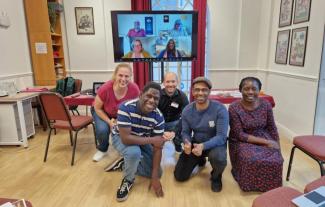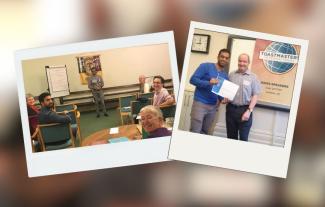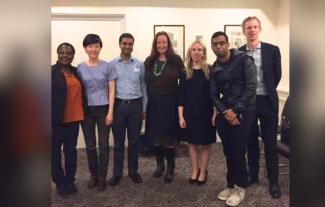
Why I started my own public speaking club

Vibesan Illampooranan tells us how developing his public speaking skills has helped him with stammering.
Living with a stammer presents its unique challenges, especially in a world where communication is crucial for various aspects of life. As someone who has navigated the complexities of stammering, I've experienced first hand the difficulties it can pose in daily interactions, from speaking to people in shops and ordering in restaurants, to dating and job interviews.
In my early years my stammer made me a target for teasing by my peers, amplifying the sense of isolation. This feeling was exacerbated by the stark contrast with my non-stammering brother, who effortlessly enjoyed popularity. Secondary school became a refuge in the school library, where I battled not only with my stammer but also with dyslexia, finding solace in teaching chess to fellow learners with learning difficulties.
I thought everyone would laugh at my stammer there but they didn't, which surprised me.
My family struggled to understand why I stammered. Communicating with them proved challenging. I felt comfortable around them, which seemed to reduce my stammer, but when it did surface it left them puzzled. Attempting various techniques only heightened their distress, emphasising the complexity of being a covert stammerer.
Discovering public speaking
University life promised new friendships, but my stammer continued to hinder social interactions. I eventually made a friend who introduced me to public speaking, which opened unexpected doors. I joined a public speaking club at the university — I thought everyone would laugh at my stammer there but they didn't, which surprised me. When I did my first presentation I stammered on every single word. However, everyone calmly watched with what looked like a little bit of distress on their faces. I thought this was British politeness at its finest.
Despite stammering through every presentation, the supportive environment motivated me to pursue public speaking further, and I gained an English-speaking board level 4 award for presentation skills.

As my journey continued, I discovered 'Toastmasters', which are clubs all over the UK and internationally, where you can develop public speaking and communication skills. I attended one of them after initially feeling nervous but eventually found a home at King Speakers, a Toastmasters club in London tailored for people who stammer and/or have social anxiety. Even as I struggled, the club's supportive atmosphere helped me excel, particularly in improv speaking during 'table topics' (exercises where you speak on a subject impromptu for two minutes).
Public speaking clubs have benefitted me in a lot of ways. They have helped to reduce my anxiety about stammering and perform better in interviews, and they've given me a lot of confidence in the dating market too. I used to be quite shy about going out and meeting people, introducing myself and ordering food, so going to public speaking clubs has given me a general sense of confidence.
They have helped to reduce my anxiety about stammering and perform better in interviews, and they've given me a lot of confidence in the dating market too.
Founding my own club
I secured my first permanent job as a transplant immunology scientist at Cambridge University, which meant I could no longer attend Kings Speakers as I moved away from London. The job marked a significant milestone for me, but challenges arose in my personal life. Struggling to connect with potential partners due to nerves, I resorted to social media for communication. Recognising the need to improve my interpersonal skills, I even ventured into stand-up comedy and speed dating, gradually overcoming my shyness and achieving a beginner level of comfort in talking to the opposite sex.
A job back in London followed, but dissatisfaction with the work culture there led to my resignation, accompanied by a sense of depression. Eager to rejoin King Speakers, I was sad to discover it closed due to a lack of leadership. Undeterred, I decided to start a group up myself earlier this year and founded the 'Stammer and Social Anxiety (SASA) Toastmasters Club'. I wanted it to focus on addressing the challenges that people who stammer face in various situations.

The SASA Toastmasters Club aims to empower people who stammer, providing a supportive environment to hone skills such as interview techniques, ordering food during dates, and delivering flawless presentations. Great communication doesn't mean being fluent, so at the club we help people become engaging and effective communicators, regardless of whether they stammer or not.
If you're in or around London and fancy coming along, join us as we navigate the journey towards finding jobs and life partners, and succeeding at work together, through the link below. There's no pressure to speak if you don't want to, you can just come and observe. Through SASA Toastmasters, we can collectively discover triumphs in our personal and professional lives.
Get details of SASA Toastmasters Club, London. For other Toastmasters Clubs around the UK, visit the Toastmasters website: Find a Club page. Another organisation you can try is The Association of Speakers Clubs: see their Find a Club page.
Would you like to share your story, experiences, opinions, poems, art, music etc? See Submit Something For The Site or email editor@stamma.org to find out how. Read more Your Voice articles.



































